Comprehensive Pest Control Strategies in Fayetteville
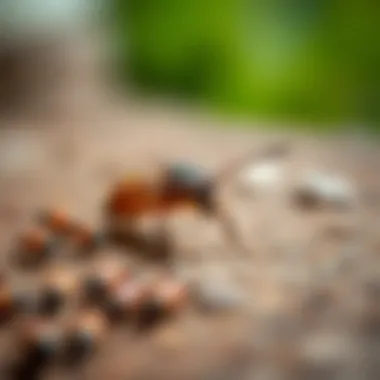
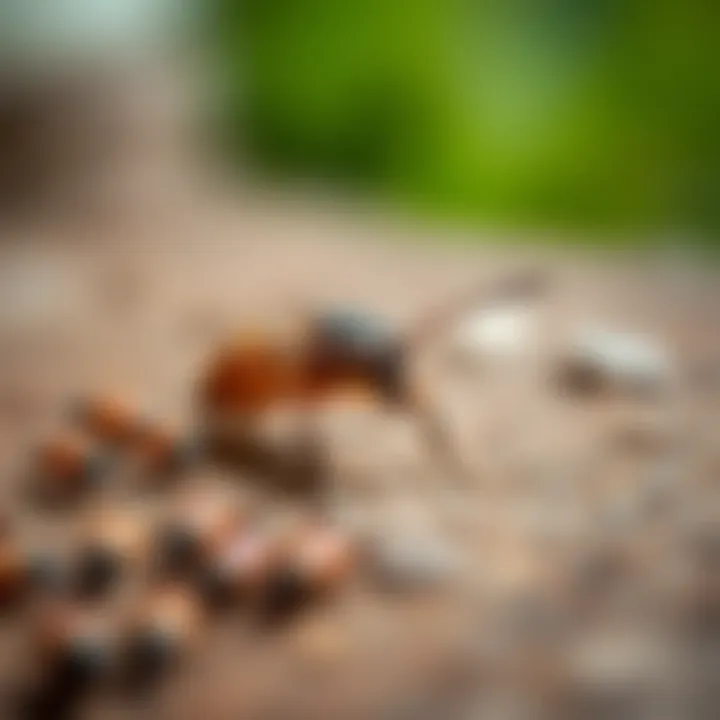
Intro
In Fayetteville, Georgia, pests can be more than just a nuisance; they often impact the peace of mind of homeowners and can even pose health risks. An active approach to pest control is vital. This means not just reacting to issues as they arise, but proactively managing the factors that contribute to pest infestations. In this article, we’ll take a closer look at what pests are common in the area, how to prevent them, and the various methods of control available that are both effective and sustainable. Whether you're a dedicated housewife or a conscientious homeowner, understanding these strategies is essential to keeping your living space comfortable and safe.
Understanding the Pest
To effectively manage pests, it is crucial to understand the nature of these unwelcome visitors. By identifying common pests and understanding their life cycles, homeowners can take informed actions to prevent infestations.
Identification
Recognizing the pests that invade your home is the first step in pest management. Common culprits in Fayetteville include:
- Ants: Various species like fire ants and carpenter ants may invade properties in search of food.
- Termites: These frequently go unnoticed until significant damage has occurred.
- Cockroaches: Known for their resilience, these pests can often be found hiding in dark, warm places.
- Spiders: While not all spiders are harmful, their presence can certainly be unsettling.
Life Cycle
Understanding a pest's life cycle helps in timing control measures effectively. For instance, knowing when termites swarm can aid in preventive treatments. Most pests undergo stages such as egg, larva, pupae, and adult—each stage can require different control methods for effective management.
Pest Prevention Strategies
Effective pest control begins long before you see a bug scuttling across your floor. Proactive measures can save you a lot of trouble later on.
Environment Modification
Adjusting your environment to deter pests is essential. Here are some effective practices:
- Seal Entry Points: Pests can squeeze through tiny gaps. Inspect and seal cracks around windows, doors, and foundations.
- Remove Standing Water: Pests like mosquitoes thrive in stagnant water. Regularly check your property for areas where water collects.
- Proper Food Storage: Store food in airtight containers to keep pests at bay.
Physical Barriers
Physical barriers can also prevent pests from entering your home.
- Screens on Windows and Doors: Make sure to use fine mesh screens to block out flying insects.
- Gravel Barriers: Surrounding your home with gravel can make it difficult for pests to enter.
Control Methods
When preventing pests fails, various control methods come into play. A blend of strategies can yield the best results.
Chemical Control
Chemical treatments may be necessary for severe infestations. It’s important to select pesticides that are effective yet pose minimal risk to family and pets. Always follow label instructions carefully.
Biological Control
Biological control methods use natural predators to keep pest populations in check. For example, ladybugs can help control aphids in your garden. This method is not only safe, but it also promotes a biodiverse ecosystem.
"An ounce of prevention is worth a pound of cure." - Benjamin Franklin
In pest control, this adage holds great importance. A proactive approach will save time, money, and stress.
Ending
Understanding the factors that attract pests and applying preventive strategies can greatly assist in maintaining a pest-free home. For homeowners in Fayetteville, GA, knowing how to identify pests, modify the environment, and implement control methods makes all the difference. By exercising vigilance and employing effective strategies, you can fend off unwelcome invaders and safeguard your sanctuary.
For more information about pest control practices, you may find these resources useful:
- National Pest Management Association
- University of Georgia Extension
- Centers for Disease Control and Prevention (CDC) Pest Control
By taking an active role in pest management, you're not only protecting your home but also enhancing the quality of life for those within it.
Preface to Active Pest Control
The challenges posed by pests are not merely an inconvenience; they can directly impact day-to-day life and health in Fayetteville, Georgia. In a region where both climate and local ecosystems vary, understanding active pest control becomes paramount for homeowners. It's not just about swatting away a few flies or setting traps for mice. It's about developing a proactive approach that caters to managing invasive species and maintaining a safe home environment.
This article navigates through the essential components of effective pest control, from comprehending why it is necessary to various strategies that can be employed to manage pests. Whether you are a seasoned homeowner or someone newly navigating pest control, the insights provided will serve you well in creating a pest-free space.
Understanding the Importance of Pest Control
Active pest control forms a crucial part of home management. When pests, such as rodents or insects, invade a home, they can pose numerous health risks, and many can transmit diseases that affect humans and pets alike. Also, pests damage structures, furniture, and food supplies, adding financial burdens on homeowners. For example, a termite infestation may go unnoticed until significant structural damage occurs. Thus, the earlier pests are addressed, the lesser the consequences.
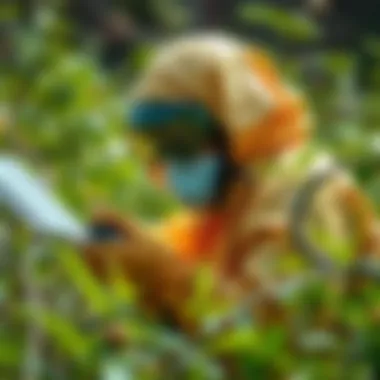
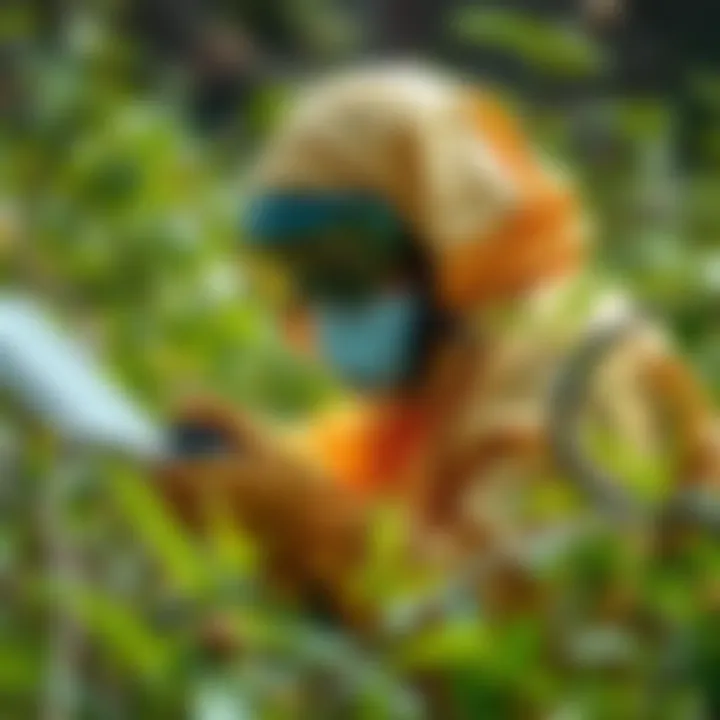
Utilizing active pest management not only ensures physical safety but also contributes to peace of mind. A household free from pests often feels more inviting and hygienic, fostering a comfortable living environment.
Overview of Pest Management Strategies
Pest management encompasses a broad spectrum of strategies designed to prevent and control pest outbreaks effectively. It is essential to adopt a holistic approach that considers both immediate actions and long-term sustainability. Here are some common strategies:
- Prevention: Ensuring that food is stored properly and that any potential entry points are sealed can deter many pests from gaining access.
- Monitoring: Regular assessments of both the interior and exterior of the home for signs of pests can lead to early detection of issues.
- Control Measures: Depending on the severity of an infestation, options might include the use of traps, barriers, or targeted pesticides, always emphasizing safety and compliance with local regulations.
Engaging in these strategies allows homeowners not only to combat current infestations but also to create an environment less hospitable to future pests, making active pest control a fundamental part of maintaining a home.
"An ounce of prevention is worth a pound of cure." It's always better to address potential pest problems before they escalate.
As we delve deeper into the article, we'll explore more specific pests common to Fayetteville, the intricate pest control techniques that can be employed, and sustainable practices that add a layer of environmental consciousness to pest management.
Common Pests in Fayetteville
In Fayetteville, the pest control arena is not merely a matter of convenience; it is a pressing reality that affects the quality of life in homes. Pests such as rodents and certain insects thrive in the temperate climate, making it crucial for residents to be aware of the common nuisances they might face. Understanding these common pests helps in fostering a proactive strategy for management. It’s not just about getting rid of these pests; it’s about preventing them from becoming a more significant issue.
Rodents and Their Impact on Households
Rodents, including mice and rats, can sneak into homes through the tiniest of holes, and the havoc they wreak goes beyond just being an eyesore. These critters can chew through wiring, which might lead to electrical fires or expensive repairs. Moreover, they carry diseases that can be transmitted to humans and pets, such as leptospirosis and hantavirus.
The presence of rodents can generate anxiety among residents, causing a state of unease in what should be a safe space. By recognizing the signs of a rodent infestation—like droppings, chew marks, or nests—homeowners can take swift action. Proactive measures such as sealing entry points and maintaining cleanliness are vital in safeguarding one’s home from rodent invasions.
Insect Infestations: Ants, Termites, and Cockroaches
Fayetteville homeowners often find themselves dealing with a variety of insects; among the most troublesome are ants, termites, and cockroaches.
- Ants are often seen marching through kitchens in search of food. Not just a nuisance, some species like carpenter ants can cause structural damage to homes. Their colonies can expand rapidly, and without swift intervention, they can easily become a major nuisance.
- Termites pose another level of concern, as they silently munch away at wood structures, often without detection until significant damage occurs. The cost of termite damage can escalate quickly, making early identification and treatment essential.
- Cockroaches are not just creepy crawlers; they can trigger allergic reactions and asthma in some individuals. They thrive in warm, damp areas and are known for their resilience against various extermination methods. This makes managing an infestation particularly challenging.
Each type of insect comes with its own set of challenges, but solutions exist. Effective pest management includes identifying species, understanding their behavior, and employing targeted treatments.
Dealing with Seasonal Pests
Seasonal changes in Fayetteville bring with them a new cast of pests that residents must contend with. In spring and summer, mosquitoes begin to swarm, quickly making outdoor spaces less inviting. Not only are they annoying, but they also pose health risks due to diseases like West Nile virus.
As fall rolls around, wasps and bees become more active as they prepare for the colder months. These aggressive insects can ruin a barbecue or outdoor event if their nests are nearby.
To handle seasonal pests effectively, routine inspections of properties should be a must. Homeowners should ensure that there are no standing water sources around, which attract mosquitoes. Additionally, regular maintenance of gardens and yards—from trimming back overgrown bushes to sealing up potential entryways—can greatly reduce the likelihood of unwelcome visits from these pests.
"Being proactive in pest management not only protects your home but also enhances the overall comfort of your living environment."
The challenge of dealing with pests in Fayetteville is multi-faceted but manageable. Through careful observation and timely action, one can ensure that their home remains a sanctuary free from unwanted pests.
Active Pest Control Techniques
Effective pest control requires a multifaceted strategy that goes beyond simply reacting to infestations. Active pest control techniques are both proactive and preventive, designed to manage common nuisances in a sustainable manner. This proactive approach not only minimizes the immediate pest issue but also addresses the factors that contribute to pest infestations, making it an essential topic for homeowners in Fayetteville. Understanding these techniques will empower residents to create a healthier living environment by mitigating risks related to pests, ultimately safeguarding their homes and families.
Integrated Pest Management (IPM) Approach
The Integrated Pest Management (IPM) approach has gained prominence in recent years, emphasizing a holistic understanding of pest behavior and ecology. IPM prioritizes using a combination of strategies tailored to the specific pest situation at hand rather than relying on a single method. Some of the core concepts behind IPM include:
- Monitoring: Keeping a close eye on pest populations aids in identifying problems before they spiral out of control. Tracking pest activity offers valuable insight into when and where interventions are necessary.
- Threshold Levels: Determining acceptable pest levels is crucial. Not every pest needs to be eliminated; sometimes, managing populations to maintain them below a certain threshold is more effective and practical.
- Control Tactics: IPM encourages the use of multiple control measures such as cultural practices, habitat manipulation, biological control, and targeted chemical use when necessary. This multi-faceted strategy significantly reduces reliance on pesticides.
By fostering a landscape that actively discourages pest infestations, residents can not only protect their homes but also support a healthier ecosystem.
Physical and Mechanical Control Methods
Physical and mechanical control methods serve as a direct line of defense against pests, especially for homeowners who may not want to use chemicals inside their premises. These methods can involve a mix of barriers, traps, and environmental modifications. Here are some key practices:
- Exclusion: Sealing cracks and crevices, using door sweeps, and installing screens on windows can prevent pests from entering homes.
- Traps: Utilizing sticky traps, bait stations, or mechanical traps can help reduce pest populations actively and monitor infestations.
- Sanitation: Maintaining a clean environment minimizes food sources for pests. Regularly cleaning kitchens, promptly disposing of garbage, and clutter control can thwart potential infestations.
Households can protect themselves against unwelcome visitors using these techniques while maintaining functional living spaces without hazardous materials.
Chemical Applications: Safe Use and Effectiveness
While many homeowners might shy away from chemical treatments due to safety concerns, it's essential to understand that when used correctly, pesticides can be an effective tool in pest management. Here are some considerations regarding their application:
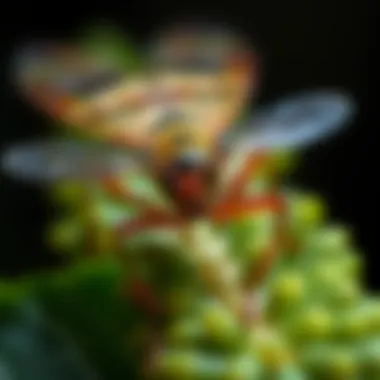
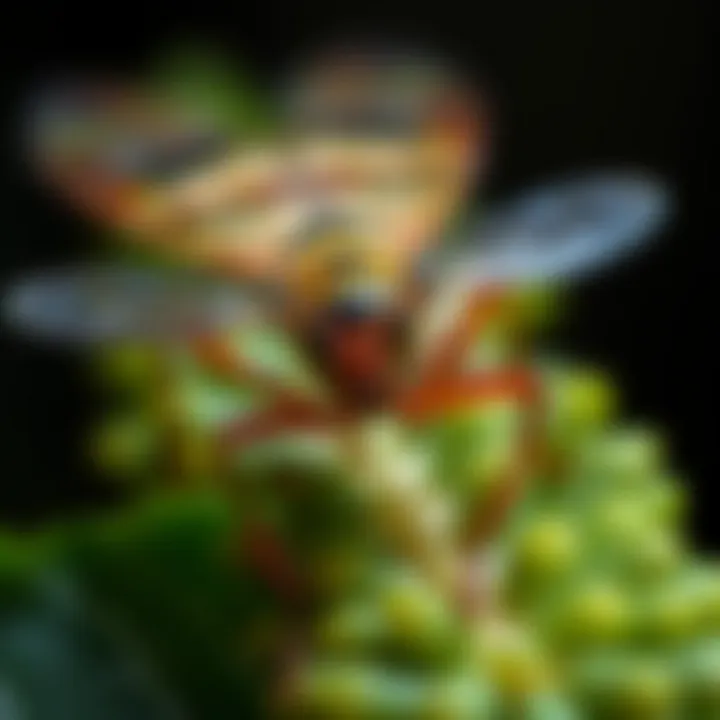
- Targeted Application: Instead of blanket spraying, using targeted applications can yield results with less product while minimizing risks to non-target organisms and humans.
- Follow Instructions: Adhering strictly to product instructions ensures the chemical's effectiveness and safety. Misapplication could lead to ineffective results or associated health risks.
- Safety Measures: Wearing appropriate protective gear during application, ventilating the area, and keeping pets and children away can significantly reduce potential hazards.
Adopting a cautious yet informed approach to chemical usage can effectively control pest populations and maintain the safety of residents.
Biological Control Options
Biological control focuses on using natural predators or parasites to manage pest populations, effectively harnessing nature's mechanisms. Here, education plays a crucial role, as homeowners need to understand the local ecosystem. Some viable options include:
- Beneficial Insects: Introducing ladybugs or lacewings can help manage aphid populations naturally.
- Nematodes: These microscopic worms can target grubs and other soil-borne pests, providing a chemical-free solution.
- Microbial Products: Using beneficial bacteria can help keep pest populations in check while being safe for human use.
Understanding how these natural partnerships work can lead to effective pest control without resorting to harsh chemicals, fostering a balanced environment.
"Adopting an active pest control strategy not only resolves current issues but also prevents future infestations, promoting a long-term solution for households."
Implementing these active pest control techniques will empower Fayetteville homeowners, contributing to a more sustainable approach to pest management.
Eco-Friendly Pest Control Practices
In today's world, where environmental concerns loom large, employing eco-friendly pest control practices in Fayetteville is not just an option but a necessity. The importance of these practices stems from the need to protect both our health and the delicate ecosystem around us. Using chemical pesticides often comes with a bag of tricks, including possible long-term effects on the environment, human health, and wildlife. Families and homeowners are looking for safe alternatives to handle pest problems while minimizing ecological damage.
Natural Repellents and Deterrents
Natural repellents play a pivotal role in eco-friendly pest management. Unlike synthetic chemicals, they are generally less harmful to humans and pets. Common examples include essential oils such as peppermint and eucalyptus, which can deter insects like ants and spiders. Homemade potions using vinegar or salt can also keep various pests at bay. Notably, the benefits of using these natural methods extend beyond safety—you’re also cutting costs!
- Use peppermint oil spray to ward off ants and spiders.
- Vinegar can be used to create a simple insect repellent. Mix equal parts vinegar and water in a spray bottle.
- Try planting marigolds around your home; they naturally repel nematodes and other unwelcome guests.
The Role of Beneficial Insects in Pest Management
Beneficial insects, often dubbed the unsung heroes in the pest management arena, truly deserve a spotlight. These little allies, such as ladybugs and lacewings, feast on harmful pests like aphids and caterpillars. By attracting these beneficial insects to your garden, you can significantly reduce the pest population without the use of harmful chemicals. Gardeners can facilitate this by planting a variety of flowers and herbs that provide food and habitat for these beneficial species.
"They say good things come in small packages, and when it comes to beneficial insects, that couldn’t be truer."
- Ladybugs can eat up to 5,000 aphids in their lifetime.
- Lacewings are excellent for controlling whiteflies and thrips.
Encouraging a more diverse ecosystem not only aids in pest management but also enhances your garden's health and beauty.
Sustainable Landscaping Techniques
When it comes to pest control, your backyard shouldn't just look good; it needs to function well, too. Sustainable landscaping techniques are essential in keeping pests at bay while promoting a healthy environment. This means opting for native plants that are adapted to the local climate and are more resilient to local pests and diseases. Moreover, practices such as crop rotation in vegetable gardens, using mulch for moisture retention, and implementing a habitat for wildlife can contribute significantly to an ecosystem that naturally balances pest populations.
- Choose native plants: They require less water and are more resistant to local pests and diseases.
- Composting: Enrich soil health while reducing waste that could attract pests.
- Mulching: It helps retain soil moisture and minimizes weed growth, thus reducing harborage for pests.
Incorporating these eco-friendly practices not only improves your pest management strategies but also establishes a sustainable lifestyle that can benefit the Fayetteville community as a whole.
Professional Pest Control Services in Fayetteville
Navigating the world of pest control can feel like you're stepping into a minefield; one wrong step and you could be dealing with a much bigger issue than you anticipated. In Fayetteville, this holds especially true. The region's climate and environment can invite a smorgasbord of pests that are not just a nuisance but can also pose a serious threat. Thus, professional pest control services are not merely an option—they're essential.
Choosing the Right Pest Control Provider
When it comes to selecting a pest control provider in Fayetteville, it pays to do your homework. Not all pest control companies are created equal. Look for a provider that offers a tailored approach to pest management, focusing on your unique situation rather than using a one-size-fits-all method. Does the company provide a comprehensive inspection to evaluate what types of pests you are dealing with? Are they equipped to handle it? These are crucial questions.
Here are several factors to consider:
- Reputation: Word of mouth can be golden. Check online reviews or ask your neighbors for their experiences.
- Licensing and Certification: Ensure any provider you consider holds the proper licenses as mandated by Georgia law. A well-regarded company will be happy to share this information.
- Experience: An established company is likely to have dealt with a variety of pests and learned a thing or two in the process.
- Eco-Friendly Options: If sustainability is important to you, inquire whether they offer green pest control solutions.
Evaluating Service Offerings and Expertise
Once you've narrowed down your choices, the next crucial step is to evaluate the service offerings and expertise of each provider. Not all pest control companies run the same playbook. Some may focus on residential properties, while others excel in commercial pest management. Understanding what services are included can save you headaches later.
- Comprehensive Services: Does the provider offer an array of pest control options, such as rodents management, insect extermination, and preventive treatments? A diversified portfolio usually indicates a robust understanding of pest behavior.
- Treatment Methods: Ask about their methods—do they employ an Integrated Pest Management (IPM) approach, or is it heavier on chemical use? Knowing this can enlighten you on how they will approach the problem.
- Follow-Up Services: Effective pest control doesn't stop at the first treatment. Inquire whether the company provides follow-up visits to ensure that the problem stays solved. Pest control is often about prevention as much as it is about elimination.
By carefully considering these elements, homeowners in Fayetteville can anchor their decisions in informed choices, providing a sense of security and peace of mind. After all, the aim is not just to eliminate pests but to foster a safe and comfortable living environment.
"In pest control, knowledge is power. Choose wisely to safeguard your home."
For more information on pest control resources, feel free to check out the National Pest Management Association at npma.org for trustworthy tips and guidelines.


DIY Pest Control: When to Consider It
In the world of pest control, tackling the issue on your own can seem appealing. Many residents of Fayetteville may wonder when they should roll up their sleeves and take action versus calling in the professionals. Understanding the nuances of DIY pest control can empower homeowners, adding layers of comfort and security in their own spaces.
When considering DIY pest control, several factors come into play. It's essential first to understand that not every pest problem is created equal. Minor infestations may allow for some elbow grease and do-it-yourself techniques, while larger issues might require expert intervention. Knowing the extent of the problem and selecting a method that's appropriate for your situation is vital.
One of the standout benefits of going the DIY route is cost savings. Hiring a professional service can run up the tab considerably, especially if the problem requires multiple visits or treatments. By managing smaller issues yourself, you can keep your wallet happy while still maintaining a pest-free environment.
However, caution is key. Handling certain types of pests—like termites or bed bugs—without adequate knowledge could make matters worse. Anyone who decides to pursue DIY pest control should consider the implications of their actions, both from a safety and effectiveness standpoint. It’s also crucial to remember that understanding pest biology can be a game-changer. Knowing how they breed and where they hide will inform any strategy you choose to deploy.
DIY pest control can be liberating, but it shouldn't be taken lightly. Here are some things to ponder regarding whether it’s a suitable choice:
- Extent of the Infestation: Small problems can often be managed effectively, while large infestations might require professional help.
- Type of Pest: Some pests, like rodents or insects, may be more amenable to DIY solutions, whereas wood-destroying pests call for expert treatment.
- Available Time and Resources: Are you prepared to devote time and effort to identify and eliminate the pests? If not, a professional may save you headache.
"DIY pest control can save dollars in the pocket but beware of biting off more than you can chew."
In short, weighing your options and assessing your own comfort level when it comes to pest management will help in deciding whether DIY is the way to go.
Necessary Tools and Materials
If you find yourself opting for the DIY method, you’ll want to ensure you’re equipped with the right tools and materials. The success of your efforts largely hinges on having the proper gear at hand. Here's a quick rundown of essentials:
- Protective Gear: Gloves, masks, and goggles are a must when handling chemicals or dealing with pests directly.
- Baits and Traps: Depending on the pests you’re dealing with, traps can help manage rodents and insects effectively. For ants, a bait system might work wonders.
- Sprays and Powders: Choose safe, effective insecticides and rodenticides. Always read labels to understand the materials you’re working with.
- Cleaning Supplies: A good scrub brush, buckets, and disinfectants will help in eliminating remnants of infestations and preventing future ones.
- Sealing Materials: Caulk and mesh can seal off potential entry points. Keeping pests out in the first place can make all the difference.
Taking the time to gather necessary tools not only shows good planning, but it also equips you to tackle pest issues head-on.
Identifying and Assessing Infestations
To launch any effective DIY pest control, being able to identify and assess your infestation is paramount. Missing the signs can lead to a much bigger problem down the line. Start by looking for common indicators of pest presence, which can vary greatly from one type of pest to another. Here’s what to consider:
- Droppings and Urine: Rodents leave droppings, and certain insects may shed skins or leave behind specific debris. Clean all surfaces thoroughly, but be sure to wear protective gear as you handle any waste.
- Damages to Property: Look out for holes in walls, gnaw marks on furniture, or missing food items. Any sign of property damage can be a clue.
- Noises: Sometimes, the sounds of scratching or scurrying can alert you to an ongoing infestation.
- Physical Sightings: Don’t hesitate to take note of actual sightings of pests. Documentation can aid in identifying patterns.
- Time and Frequency: Understanding how long the problem has persisted can guide you in deciding whether you can manage the issue or if it's beyond your control.
Combining all these observations will give you the insight needed to formulate a plan. Remember, not every pest is easy to get rid of, and if it feels overwhelming, reaching out to a professional might just be the smartest move you can make.
Legal Considerations and Regulations
Understanding the legal landscape of pest control is absolutely crucial for homeowners and service providers alike. Failing to follow regulations can lead to consequences that go far beyond simply having a pest problem. Not only can improper pest management harm your health and property, it can also impose hefty legal liabilities or fines. Clear knowledge of relevant laws helps in ensuring safety, effectiveness, and compliance.
The legal framework around pest control activities in Fayetteville and Georgia at large lays down guidelines that protect both consumers and the environment. It’s essential for homeowners to be aware of these regulations, as they shape how pest control can be practiced effectively and safely in residential settings.
"Protecting your home and community starts with understanding your rights and responsibilities regarding pest management."
State Guidelines for Pest Control
Each state has its own set of guidelines for pest control. In Georgia, the Georgia Department of Agriculture governs the pest management industry through specific regulations. For instance:
- Licensing Requirements: All pest control operators must be licensed, ensuring they have the necessary training and knowledge to handle chemicals safely.
- Pesticide Application: There's a strict protocol for the application of pesticides, including where and when they can be used. Certain outdoor applications may be banned near schools or daycare centers. It’s critical to read through these restrictions to avoid penalties.
- Record Keeping: Companies are required to maintain accurate records of pest control procedures. This includes what chemicals were used, where they were applied, and the timing of the treatments. Keeping up with such records not only satisfies regulatory requirements but also provides a reference in case issues arise later.
Before engaging any pest control services, homeowners should do their homework about their preferred provider’s compliance with these state regulations. Any established company should readily share their licensing information upon request.
Liability and Responsibility for Pest Management
When it comes to pest control, liabilities can be a complex maze. Homeowners need to be aware that they often share the responsibility for pest management. This means:
- Personal Liability: If a pest control treatment leads to damage or injury, such as through negligent application of pesticides, the homeowner might find themselves in hot water. Ensuring the pest control provider is fully licensed and compliant significantly reduces this risk.
- Contractual Agreements: It's wise to read through contracts with pest control companies closely. Often, these agreements will specify the terms of liability. If a company claims they will take full responsibility for pest issues, but the fine print says otherwise, you could end up paying for damages caused by their services.
- Environmental Responsibility: Additionally, the ecological impact of chemical pest control is gaining more attention. Homeowners have a moral responsibility to consider sustainable practices. Failure to follow state guidelines regarding pesticide use may also expose them to environmental liability, especially if nearby flora and fauna are affected.
Closure and Future Directions
In summarizing our exploration of pest control in Fayetteville, it becomes clear that an active approach is not just beneficial; it's essential. Homeowners must remain vigilant against the scourge of pests that can undermine peace and comfort within their abodes. Adopting diverse pest management strategies can significantly mitigate risks and enhance property value.
The Evolving Landscape of Pest Control
The pest control arena is in constant flux, adapting to new challenges and integrating fresh methodologies. For instance, an increasing awareness about environmental impacts has encouraged practices that harmonize pest management with ecological principles. Homeowners in Fayetteville are increasingly opting for integrated pest management (IPM), which blends techniques from all corners, such as physical, biological, and botanical interventions.
This evolution isn't merely academic; it translates to real-life applications that can lead to effective long-term solutions. For instance, instead of defaulting to chemical approaches, many are now exploring natural repellents as viable alternatives. Such shifts not only address immediate pest issues but also foster a healthier living environment, highlighting the dual benefits of these modern techniques.
Ongoing Research and Innovations
As the narrative of pest control unfolds, research plays a crucial role in shaping its future. Innovative solutions are on the horizon, driven by technological advancements and a deeper understanding of pest behavior. For example, studies examining the interactions between pests and native predators are reshaping how we think about biological pest control. This insight informs strategies that favor local ecosystems, enabling sustainable management of pest populations.
Furthermore, new technologies, such as smart traps that leverage AI, promise to offer real-time monitoring and targeted pest eradication. These innovations could empower homeowners to make informed decisions swiftly.
"The future of pest management lies in marrying technology with traditional methods, creating a dynamic toolkit for homeowners to ensure their living spaces remain pest-free."
The path forward is clear: both residents and professionals must remain engaged in learning about these continual changes. By adapting and evolving their strategies, the Fayetteville community can foster a resilient approach to pest management that meets both present and future needs. This commitment not only enhances the quality of life but also contributes to preserving the environment, ensuring that Fayetteville remains a peaceful haven for all its residents.







